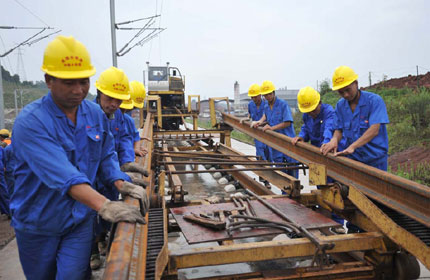New finance, tax reforms should strike a balance
Updated: 2014-07-09 08:51
By Li Yang (chinadaily.com.cn)
|
|||||||||||
The new round of finance and tax reform should rebalance relations between central and local governments to match their tax revenues to their duties, says an article of China Business News. Excerpts:
The central government passed an overall plan of deepening reform of the finance and tax systems recently. Finance Minister Lou Jiwei explained that the principle of the reform is to redistribute the tax revenues between central and local governments to better match their revenues to their duties.
The last round of finance and tax reform in 1994 diverted considerable tax revenue of local governments to the central authority. Since then, local governments have turned to land transfers and the central government’s transfer payment, a kind of fund decided by the central authority for a special purpose or local project, to make ends meet.
Both land acquisition and the application for the transfer payment cause corruption and abuse of powers.
The reform is expected to start some new tax categories for local governments and entitle more of them to issue bonds after the pilot bond reform proves practical in some cities.
The distribution of duties among governments of various levels needs to be clearer. The central government will be in charge of affairs of national defense, diplomacy, national security and the administration of national markets. The local governments will take responsibility for providing well-targeted public services for local residents.
Another noteworthy task of the tax reform is to ensure that all taxes and fees have a legal basis. There should be a clear distinction between taxes and fees. The National People’s Congress, China’s top state authority and legislature, and its local branches must supervise the governments’ collecting of fees and taxes. And all taxpayers enjoy the right to know how their money is spent.
Related Stories
Tax reform considered to remedy loophole: Minister 2014-03-06 11:52
Finance and tax system reform is key 2014-07-03 11:17
China mulls tax, household registration, judicial reforms 2014-06-07 15:54
Tax benefits expected as China pilots ESOP 2014-06-23 09:42
Today's Top News
China, Germany join hands to drive growth
Meet foreigner breed of workers
Product placement deal backfires
From Westlife to the East
Gambling costs World Cup fans their lives
US supports Ukraine's decision to suspend ceasefire
It's all about making a spectacle
China likely to see 7.5% growth in second quarter
Hot Topics
Lunar probe , China growth forecasts, Emission rules get tougher, China seen through 'colored lens', International board,
Editor's Picks

|

|

|

|

|

|





